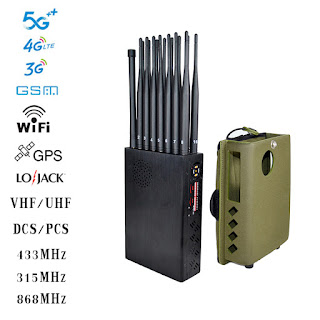How does it affect me if someone uses a GPS jammer?
GPS jammer is an electronic device that can emit electromagnetic waves with the same frequency as the Global Positioning System (GPS) signal, thereby interfering or disrupting the normal operation of the GPS receiver. The use of GPS jammers can have the following effects:
Stop GPS positioning: Using a GPS gsm jammer will make the GPS receiver unable to receive satellite signals, making it impossible to locate.
Navigation failure: The GPS jammer will disrupt the GPS signal, so the navigation system cannot function properly. This may lead to incorrect route instructions or cause the vehicle to lose its direction.
Safety issue: Using GPS jammers may cause safety issues. For example, emergency services and rescue vehicles may not be able to reach their destination using GPS navigation systems, thereby delaying rescue operations.
Illegal behavior: In many countries and regions, using GPS jammers is illegal as it may interfere with the normal operation of other people's GPS receivers, and may even lead to traffic accidents or other emergency situations.
Therefore, the use of GPS jammers is not recommended or encouraged unless permitted by specific laws or specific application scenarios.
Each country has its own regulations and policies regarding frequency and operating company information. Before understanding this information, you need to first identify the countries or regions that interest you. Generally speaking, each country has an organization similar to the Telecommunications Administration, which is responsible for managing the country's radio spectrum resources. You can inquire about frequency and operating company information from these organizations.

The following are some world-famous radio spectrum management organizations for reference:
- International Telecommunication Union (ITU): ITU is a United Nations agency responsible for coordinating international telecommunications standards and spectrum allocation. You can obtain global frequency and operating company information through ITU's website.
- European Telecommunications Standardization Organization (ETSI): ETSI is an organization responsible for European telecommunications standards and spectrum management. You can check the frequency and operating company information in the European region on the ETSI website.
- Federal Communications Commission (FCC): The FCC is the federal government of the United States agency responsible for managing radio spectrum and communications. You can check the frequency and operating company information of the United States on the FCC website.
- In addition to the above institutions, there are other local institutions in different countries, and you can find their relevant information through search engines. It should be noted that when querying and using frequency and operating company information, you need to comply with local laws and regulations, and avoid infringing on the privacy and rights of others.
- Radio interference refers to the process of intentionally or unintentionally transmitting radio signals to prevent or interfere with radio communication. These interference signals can be malicious, aimed at disrupting communication, or unintentional, such as unintentional interference signals emitted by certain electronic devices.
- Interference signals can be emitted in various ways, including broadcast interference, spectrum scanning interference, forced muting, and random noise. These signals can cause the radio receiver to receive incorrect information or be completely unable to receive any information.
- Radio Frequency signal jammer is an electronic device that can emit interference signals to interfere with the transmission or reception of radio signals. It can be used to prevent illegal eavesdropping, prevent electronic crimes, and protect confidential information.
What is the working principle of a radio frequency jammer?
The principle of RF jammer operation is to emit an interfering signal, which can overlap with the original signal, making it impossible for the original signal to be correctly received or decoded. Interference signals can be electromagnetic waves of any frequency, with sufficient strength to cancel out the original signal.
What are the types of RF jammers?
The type of RF jammer varies depending on its frequency range and usage. Common types include:
Broadband jammer: It can interfere with all frequencies within a certain range.
Narrowband jammer: can only interfere with specific frequencies.
Continuous wave jammer: emits continuous interference signals.
Pulse jammer: emits intermittent interference signals.
cell phone jammerIs the RF jammer legal?
In most countries, the use of radio frequency jammers is subject to legal restrictions. In certain circumstances, such as in military and legal enforcement, it can be legally used. However, in general, private use of radio frequency jammers is illegal and may lead to serious consequences, including fines and imprisonment.
What applications can RF jammers be used for wifi jammer?
RF jammers can be used for the following applications:
- Preventing illegal eavesdropping: In business or government meetings, RF jammers can be used to prevent the use of eavesdropping devices.
- Protecting confidential information: Radio frequency jammers can prevent radio communication from being monitored, thus protecting confidential information.
- Military use: Radio frequency jammers can be used to interfere with enemy communication equipment.
- Legal enforcement: Radio frequency jammers can be used to disrupt the communication equipment of criminals.
- It should be noted that the use of RF jammers must be legal and local laws and regulations should be understood before use.


Comments
Post a Comment